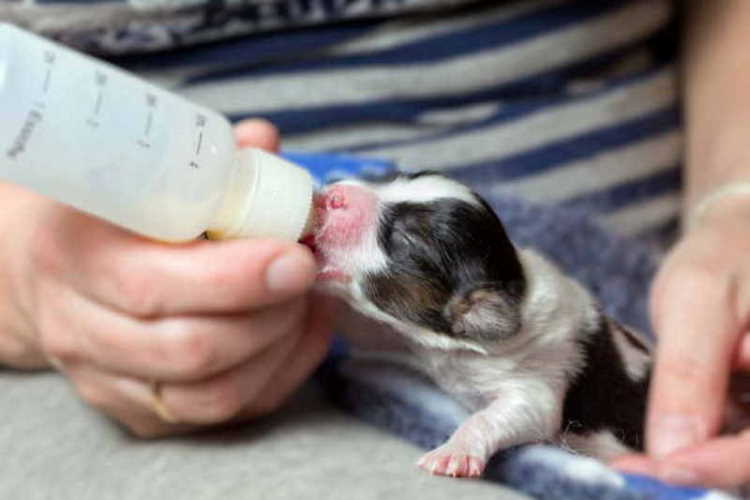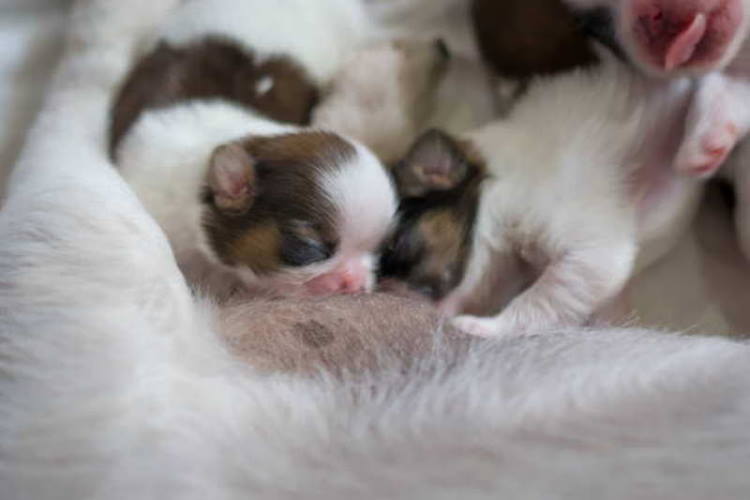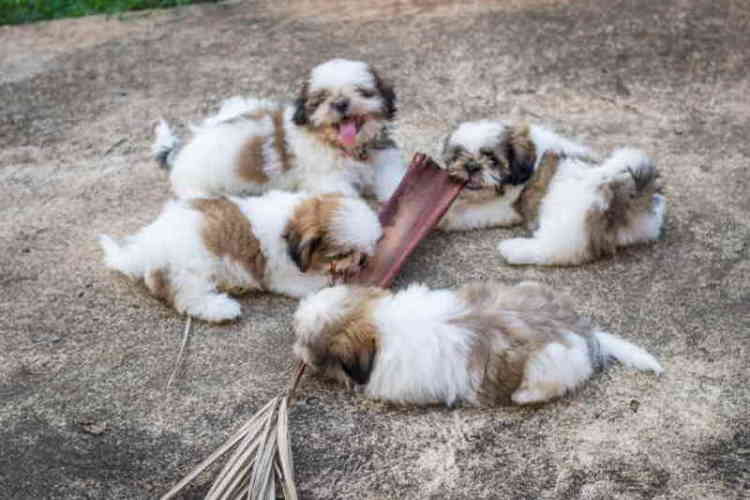Bottle-Feeding Shih Tzu Puppies
WRITTEN BY STACY | EVERYTHINGSHIHTZU.COM
Shih Tzu puppies are undoubtedly adorable, and you likely consider your adorable pup to be one of the family, or maybe even your own furry baby.
However,
when it comes to bottle-feeding your Shih Tzu puppy, it’s not because you want
to treat your pup like a baby.

Bottle feeding Shih Tzu puppies becomes a necessity for their survival if the pups become orphaned, abandoned or rejected from their mother, whether because the mother has insufficient milk supply, is ill, or perhaps the pup itself is having some health issues.
If you’re faced with having to bottle feed your puppy, or maybe even several depending on the situation, you probably have a lot of questions.
What do you feed your puppy?
How much do you feed your puppy and how often?
How do you bottle feed a Shih Tzu?
Bottle feeding a young Shih Tzu pup may seem a bit
overwhelming at first, but don't worry it isn't very hard however, you will need to arm yourself with knowledge on what to do and what not to do.
For the answers to these questions, and more insights into bottle-feeding, read on!
Why Would You Need to Bottle Feed Shih Tzu Puppies?
As mentioned earlier, most bottle-fed puppies have either been taken away from their mother too soon, orphaned by their mother, or have a mother that is unable to feed her own puppies for a variety of reasons.
Some dogs may not make enough milk to feed their whole litter, other dogs may have complications during birth that make it impossible for them to nourish their own pups, and other dogs might even face more serious conditions, or in the worst cases, die.
When this happens, tiny pups are not yet able to care for themselves or eat on their own, therefore, they need a helping hand.
Bottle feeding puppies has been a common practice in situations like the one mentioned above for quite some time, and although it can seem a little overwhelming and time-consuming, it doesn’t have to be a stressful thing to do.
Ultimately, you should only opt to bottle-feed your puppy if it is absolutely necessary; if the pup is able to get its milk from its mom, then that is the very best way to do it.
What To Feed Bottle-Fed Puppies
One of the question often asked is can puppies drink milk?
Generally giving puppy regular milk is not a good idea because it lacks many of the nutrients that a growing puppy needs.
However, you may be able to give plain old milk to a puppy in a pinch, but ideally it should only be used on an emergency basis until a more suitable formula can be obtained.
Fortunately, there are a number of commercially prepared puppy milk products that are more nutritionally balanced if you need to bottle-feed your pup; special formulas like Esbilac Puppy Milk Replacer and others are readily available.
There are basically two kinds of puppy formulas, the ones that come already mixed in a can and are ready to serve, or powdered formulas that have to be mixed before you can feed them to your pup.
The biggest difference between the two is one is ready-to-go, but you have to keep it refrigerated, and the other is a powder, so no refrigeration needed, but you have to mix it up before using it.
Of course, very similar to humans, the ultimate best thing to feed a young puppy is its mother’s milk, but when that isn’t possible, there are many high-quality puppy formulas on the market.
The powdered varieties are usually cheaper, but it is ultimately whatever works best for you and your schedule, and naturally, your precious puppy.
How Do You Bottle Feed Puppies?
Okay, so you get why bottle-feeding is necessary and what you need to feed your pup, but how on earth do you do it?
First things first, a consultation with your vet is always a good idea; she can advise you if bottle-feeding is indeed what you need to do, and if so, she can walk you through the steps, answer any nagging questions that are in the back of your mind, and even give you a demonstration.
When you bottle-feed your puppy, your dog gets to control how much formula she gets, but you need to make sure you watch her closely to ensure she doesn’t eat too fast and swallow too much air.

Before you actually start feeding your pup, there are several steps to follow through first:
- Wash your hands, your little babies are still developing their immune systems.
- Clean all of your supplies -- all bottles, nipples, etc. should be sterilized in boiling water for a few minutes each time you mix up your formula, you don’t want any bacteria sticking around from the last feeding.
- Before using a nipple for the first time, you will need to prep it. Poke it with a heated, sterilized safety pin to create two small holes. When you shake the bottle, only a few drops should come out at a time.
- Prepare the puppy formula according to the instructions on the container.
- Ensure the formula is warm before serving it to your puppy, you can test a few drops on your wrist to make sure it’s not too hot or too cold.
Now that all of your prep work is done, it’s feeding time! Here are some pointers to keep in mind:
- Make sure to have everything you need within arms reach; bottle, towels, and blankets.
- Find a comfy place for you and your puppy to sit.
- Ensure that your puppy is warm and alert and ready to feed, if she seems lethargic or cold, get in touch with your vet at once
- Gently wrap your puppy in a blanket to keep her warm and help her stay still.
- Your puppy should be lying on her belly when you feed her. This helps prevent fluid from going into her lungs and also helps prevent her from choking.
- Place the nipple of the bottle into your pup’s mouth, this might take some time, and eventually, she should latch on and figure things out. If she doesn’t get it right away, be patient.
- Monitor your puppy constantly as she drinks too to make sure the liquid is not coming out too fast. If you are having issues, contact your vet for support.
After the feeding, there are also a few important, although maybe not the most pleasant, steps to address.
Puppies’ mothers help them go potty, you probably don’t want to know how (ahem, with their mouths).
Simply get a warm, damp cloth and rub your puppy’s tummy, as well as her anal and genital areas, to help facilitate her ability to do what she needs to do.
Your puppy may or may not need to go potty after each feeding, and that is okay, but it’s always important to help her try.
After the feeding, wash your hands and make sure your puppy stays warm.

What Feeding Schedule Should You Follow for Bottle-Fed Puppies?
For every 8 ounces of body weight, a puppy should eat roughly one ounce of food. For example, if your puppy weighs five pounds, she should get about 10 ounces of food per day.
Since puppies are growing and developing they have a significantly higher calorie need than adult dogs, but their stomachs are small.
Therefore, it is important to divide their required daily calories over several smaller meals and allow them to eat frequently throughout the day.

As mentioned previously it is always better that a puppy get its nourishment
from it’s mom, and should never be done unless the mom is unable to nurse.
But if you are faced with the situation of bottle-feeding your puppy, these tips can help you tackle the task with confidence.
Whenever you need some extra insight or are unsure about how your puppy is doing, it is critical to contact your vet as soon as possible.
Good luck, puppy parents!



